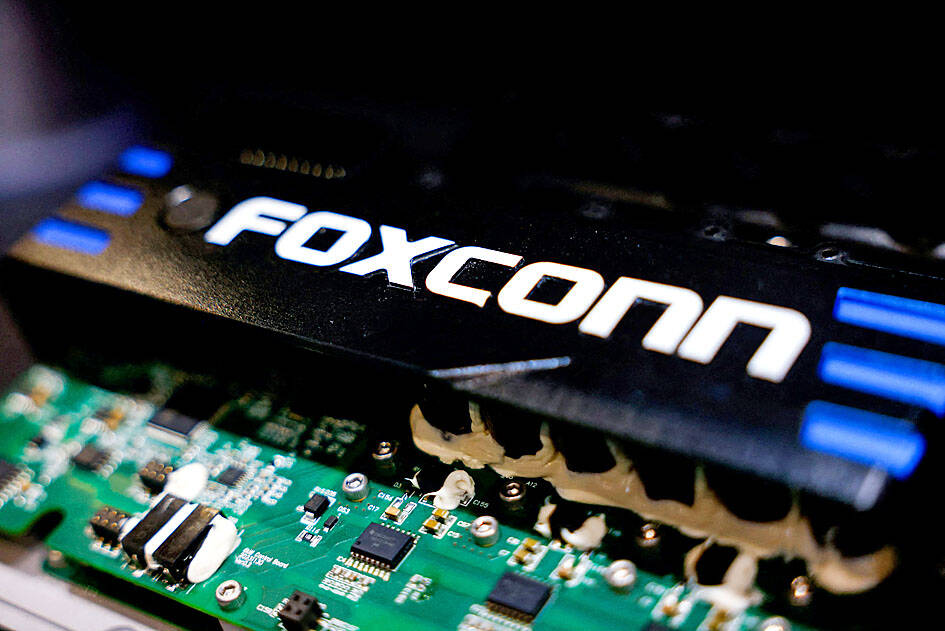Apple Inc. supplier Hon Hai Precision Industry Co (鴻海精密), also known as Foxconn Technology Group (富士康科技集團), and Dixon Technologies India Ltd are asking India to pay them billions of rupees in subsidies they think they are entitled to under the government’s production incentives program.
The government pledged a total of 410 billion rupees (US$4.8 billion) in subsidies to manufacturers, and part of that remains unallocated because some companies did not meet estimated production targets. Foxconn and Dixon argue that, according to the program rules, they are eligible for some of the unallocated funds, people familiar with the matter said.
Foxconn could get as much as 6 billion rupees and Dixon 1 billion rupees if the government releases the funds, the sources said, asking not to be identified as the matter is not public. The government is reviewing the two requests, the people said.

Photo: Ann Wang, Reuters
Representatives of Foxconn, Dixon and Indian Ministry of Electronics and Information Technology did not respond to requests for comment.
Indian Prime Minister Narendra Modi’s production-linked subsidy plan set annual value-based thresholds for global and local electronics firms, capped at certain levels. The project also envisaged that any unused subsidies, resulting from some companies failing to produce enough to hit their caps, would be allocated to the remaining eligible applicants that exceeded theirs.
Foxconn’s roughly 300 billion rupees of iPhone production in the fiscal year through March 2023 exceeded its cap of 200 billion rupees, and Dixon’s production of 80 billion rupees in the fiscal year through March last year surpassed its cap of 60 billion rupees.
While the amount of money at stake in the unallocated funds debate is relatively small, it is an important test of Modi’s industrial policy ambitions. Companies want to see the administration follow through on regulations that have led to significant investments, including Apple partners assembling US$14 billion of iPhones locally last fiscal year as they diversify beyond China. South Korea’s Samsung Electronics Co has also levered the plan to step up exports.
The stability of Indian policy making becomes even more important as India tries to woo chipmakers, and tech giants such as Microsoft Corp plan to invest billions in the world’s most populous country to expand cloud computing and artificial intelligence.
To be sure, the Modi administration regularly releases subsidies within the cap to all companies participating in the drive.
In contract manufacturer Dixon’s case, the government is also reviewing whether the supplier made new investments for producing Xiaomi Corp’s (小米) smartphones or whether machines were merely shifted out of another factory which previously assembled the Chinese brand’s devices, one of the sources said.
Xiaomi has lost ground to rival smartphone makers in India, which has led to lower production of its devices, which further complicates the handing of funds meant to boost smartphone output.

Real estate agent and property developer JSL Construction & Development Co (愛山林) led the average compensation rankings among companies listed on the Taiwan Stock Exchange (TWSE) last year, while contract chipmaker Taiwan Semiconductor Manufacturing Co (TSMC, 台積電) finished 14th. JSL Construction paid its employees total average compensation of NT$4.78 million (US$159,701), down 13.5 percent from a year earlier, but still ahead of the most profitable listed tech giants, including TSMC, TWSE data showed. Last year, the average compensation (which includes salary, overtime, bonuses and allowances) paid by TSMC rose 21.6 percent to reach about NT$3.33 million, lifting its ranking by 10 notches

Popular vape brands such as Geek Bar might get more expensive in the US — if you can find them at all. Shipments of vapes from China to the US ground to a near halt last month from a year ago, official data showed, hit by US President Donald Trump’s tariffs and a crackdown on unauthorized e-cigarettes in the world’s biggest market for smoking alternatives. That includes Geek Bar, a brand of flavored vapes that is not authorized to sell in the US, but which had been widely available due to porous import controls. One retailer, who asked not to be named, because

SEASONAL WEAKNESS: The combined revenue of the top 10 foundries fell 5.4%, but rush orders and China’s subsidies partially offset slowing demand Taiwan Semiconductor Manufacturing Co (TSMC, 台積電) further solidified its dominance in the global wafer foundry business in the first quarter of this year, remaining far ahead of its closest rival, Samsung Electronics Co, TrendForce Corp (集邦科技) said yesterday. TSMC posted US$25.52 billion in sales in the January-to-March period, down 5 percent from the previous quarter, but its market share rose from 67.1 percent the previous quarter to 67.6 percent, TrendForce said in a report. While smartphone-related wafer shipments declined in the first quarter due to seasonal factors, solid demand for artificial intelligence (AI) and high-performance computing (HPC) devices and urgent TV-related orders

MINERAL DIPLOMACY: The Chinese commerce ministry said it approved applications for the export of rare earths in a move that could help ease US-China trade tensions Chinese Vice Premier He Lifeng (何立峰) is today to meet a US delegation for talks in the UK, Beijing announced on Saturday amid a fragile truce in the trade dispute between the two powers. He is to visit the UK from yesterday to Friday at the invitation of the British government, the Chinese Ministry of Foreign Affairs said in a statement. He and US representatives are to cochair the first meeting of the US-China economic and trade consultation mechanism, it said. US President Donald Trump on Friday announced that a new round of trade talks with China would start in London beginning today,